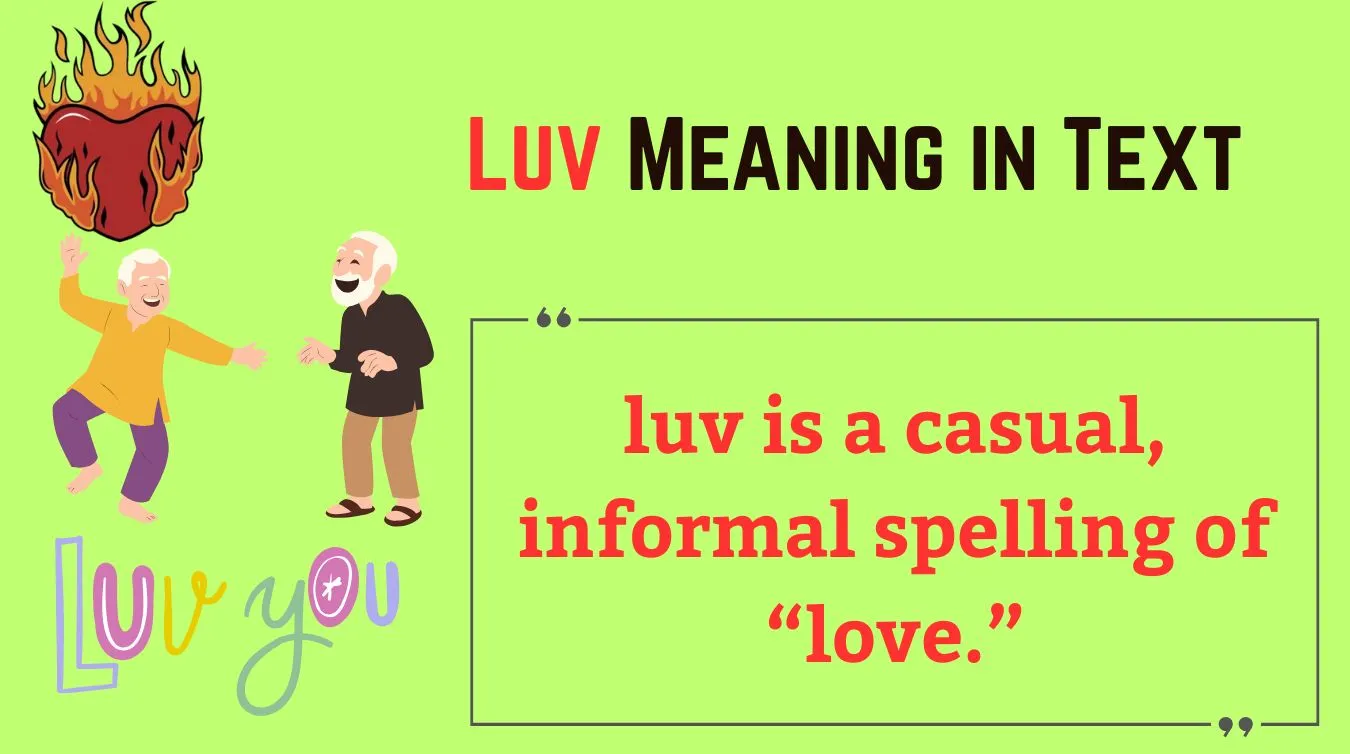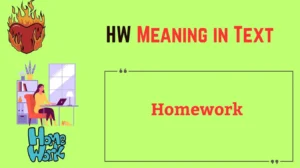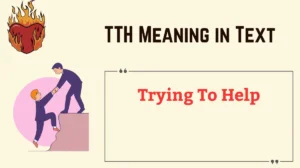Last updated on October 19th, 2025 at 06:39 am
Texting language has its own rhythm. Words get shortened, spellings shift, and meaning bends depending on who’s talking. One of the most common examples is “luv.”
You’ve probably seen it in messages, comments, or even song lyrics. But what does luv actually mean in text, and how should you use it?
This guide breaks down the full story—from its origins to cultural nuances, its role in online communities, and even when you should avoid using it.
What “Luv” Means in Text
At its core, luv is a casual, informal spelling of “love.” It softens the word and often carries a warmer or more playful tone.
Unlike love, which can feel heavy or serious, luv usually signals something lighter: affection, friendliness, or casual fondness.
Examples:
- “Thanks, luv!” (friendly)
- “Goodnight, luv 😘” (romantic)
- “Alright then, luv.” (sarcastic or dismissive in some regions)
Key takeaway: Luv can be affectionate, casual, or even ironic. Its exact meaning depends heavily on tone, context, and relationship.
What Does “Luv” Mean from a Girl 💖

When a girl says “luv,” it’s usually a cute or casual version of “love.” But the real meaning depends on how she uses it and the tone of the conversation.
Here are some common meanings:
- 💬 Friendly tone: “Thanks, luv!” → She’s just being sweet and friendly, not romantic.
- 💞 Flirty tone: “Miss you, luv 😘” → She’s showing affection or closeness, maybe even a little flirt.
- 💌 Caring tone: “Take care, luv ❤️” → She’s being warm, kind, or emotionally supportive.
So, if a girl texts you “luv,” she’s probably being affectionate or playful — but not always in a deeply romantic way. It’s more casual and modern than saying “love.”
Origin & Background of “Luv”
The word luv didn’t appear out of nowhere. Its story traces through slang, pop culture, and the rise of texting.
- British roots: In the UK, “luv” has been used as a friendly nickname or term of endearment for decades. Shopkeepers or strangers might casually say, “You alright, luv?”
- Pop culture influence: The word became widespread in music, especially with bands and artists who stylized spelling to feel edgy or relatable. For example, The Luvvers (a 1960s British rock band) and countless song titles used “luv” instead of “love.”
- Texting era: As SMS messages charged per character in the early 2000s, people shortened words. “Luv” quickly replaced “love” in casual texts because it saved space while still expressing warmth.
Today, luv thrives in texting, online chats, and social media comments.
Usage in Everyday Contexts
Where and how you use luv can completely change the vibe of the message.
Friendly Interactions
Friends often use luv to show appreciation or care without sounding overly intense.
- “Thanks for helping, luv!”
- “See you tomorrow, luv.”
Flirty or Romantic
In dating or relationships, luv softens intimacy while still feeling affectionate.
- “Good morning, luv 😘”
- “Miss you, luv.”
Social Media
In online fan communities, luv often appears in comments under posts.
- “Love your style, luv!”
- “Congrats on the win, luv 🥳”
Humor or Playful Banter
Sometimes, luv gets dropped in ironically or sarcastically.
- “Whatever you say, luv.”
Table: How “Luv” is Used in Different Contexts
| Context | Example Message | Tone/Meaning |
|---|---|---|
| Friendly | “See you later, luv” | Casual affection |
| Romantic | “Goodnight, luv 😘” | Sweet, flirty |
| Social Media | “Great job, luv!” | Supportive/friendly |
| Sarcastic/Ironic | “Alright then, luv” | Mocking/patronizing |
Tone & Interpretation: What “Luv” Implies
Tone matters. The same three letters can mean very different things.
- Affectionate: Used between partners or close friends, it signals care.
- Friendly: In casual exchanges, it means “buddy” or “pal.”
- Sarcastic: Said in the wrong context, it can feel dismissive.
Quote from linguist David Crystal:
“Words in digital communication gain meaning not just from spelling but from the relationship between sender and receiver.”
In short, never read luv in isolation. Look at the bigger conversation.
Misconceptions & Clarifications
Some people get confused by luv. Let’s clear up common myths:
- Myth: “Luv always means romance.”
- Truth: It often just means friendliness, especially in the UK.
- Myth: “Luv is lazy spelling.”
- Truth: It’s intentional shorthand that changes tone.
- Myth: “Only young people use luv.”
- Truth: Adults in Britain have been saying “luv” for generations.
Variations, Alternatives & Similar Terms
Luv doesn’t exist in a vacuum. It’s part of a whole ecosystem of affectionate shorthand.
Common variations:
- “luv ya”
- “luv u”
- “ly”
- “ily” (I love you)
Emoji alternatives:
- ❤️
- 😘
- 💕
Comparable terms:
- Hun
- Dear
- Babe
- Bae
Each carries slightly different energy. For example, bae feels more romantic, while hun leans casual and nurturing.
Regional & Cultural Differences
How people interpret luv varies widely across regions.
- United Kingdom: Very common as a casual term, even between strangers. “Thanks, luv” is everyday language.
- United States: Less frequent. Often seen only in texts or online, not everyday speech.
- Australia & New Zealand: Similar to the UK, luv works as a casual affectionate word.
- Global online communities: The word mixes with internet culture, where tone is shaped by emojis, memes, and trends.
Case Study:
A British shopkeeper calling a customer “luv” sounds polite and warm. In the US, that same phrase might sound flirtatious or even odd, since the cultural context is different.
Use in Online Communities & Dating Apps
Luv thrives in digital spaces, but its impact depends on how it’s used.
In Online Communities
Fans use luv to hype each other up. It adds friendliness without crossing personal boundaries.
- “You look amazing, luv!”
- “Don’t worry, luv, you’ll get through it.”
On Dating Apps
The line between playful and too casual is thin. Some people love it, others find it unserious.
Pros of using “luv” on dating apps:
- Shows warmth and friendliness
- Keeps the tone light
- Feels less intense than “love”
Cons:
- Can feel dismissive if overused
- Some may interpret it as lack of seriousness
Pro Tip: Match the other person’s tone. If they use casual terms like luv, mirror it. If they lean formal, stick with full words.
When “Luv” May Carry Hidden or Negative Meaning
Not all uses of luv are sweet. Sometimes it carries a bite.
- Sarcasm: “Whatever you say, luv” can come across as mocking.
- Patronizing: In arguments, especially in British slang, luv can belittle.
- Workplace misuse: Dropping “luv” in professional settings may seem unprofessional or even condescending.
Quote from The Guardian:
“Terms like ‘luv’ can soften speech but also risk reinforcing stereotypes if used in the wrong context.”
Suitability in Professional Communication
Should you ever use luv at work? Almost never.
- Formal communication: Avoid it in emails, presentations, or client chats.
- Exceptions: In creative industries or highly informal teams, it may pass in internal chats.
- Better choices: Use words like thanks, appreciate it, or cheers to show warmth without crossing lines.
Table: Workplace Alternatives to “Luv”
| Setting | Avoid “Luv” | Use Instead |
|---|---|---|
| Client emails | “Thanks, luv” | “Thanks so much” |
| Team Slack chat | “Good job, luv” | “Nice work!” |
| Manager feedback | “Well done, luv” | “Great effort today” |
How to Respond to “Luv” in Text
Wondering what to say when someone calls you luv? Your response should match the tone and relationship.
- Friendly response:
- “Thanks, luv!”
- “Anytime, mate.”
- Romantic response:
- “Miss you too, luv ❤️”
- “Goodnight, luv 😘”
- If unsure:
- “Haha thanks, what do you mean by that?”
- Clarifying avoids miscommunication.
Golden rule: Mirror the energy. Keep it light when they’re casual, and lean romantic only if the relationship fits.
What Does “Luv” Mean from a Guy 💬

When a guy says “luv,” it can also carry different shades of meaning depending on how and where he says it.
Here’s what it might mean:
- 😎 Chill vibe: “Alright, luv” → He’s being cool and casual, maybe even copying British slang.
- 💘 Flirty vibe: “Goodnight, luv 😘” → He’s showing interest or affection without being too serious.
- ❤️ Caring vibe: “Don’t worry, luv” → He’s comforting you or trying to sound gentle.
Basically, “luv” from a guy is often a friendly or flirty version of “love.” It’s less serious than “I love you,” but it still shows warmth and connection.
FAQs About Luv Meaning in Text
Does “luv” always mean romantic love?
No. Most of the time it’s friendly or casual, especially in the UK.
Is “luv” gender-specific?
Not at all. Anyone can use it with anyone.
What’s the difference between “luv” and “love you”?
“Love you” is more serious and emotional. “Luv” feels lighter and playful.
Can “luv” be disrespectful?
Yes, if used sarcastically or in professional settings.
Conclusion
The luv meaning in text shifts depending on who says it, where they’re from, and how they mean it. At its simplest, luv is shorthand for affection, but it’s flexible enough to swing between warmth, sarcasm, and even irony.
Use it freely with friends, in casual chats, and in supportive online communities. But think twice before sending it in professional emails or early-stage dating conversations.
Remember, the power of luv lies not in the letters but in the connection between sender and receiver.

Mark Peter is the creative mind behind RizzleLineLove.com, your go-to hub for witty, flirty, and downright hilarious pick-up lines. With a passion for blending humor and charm, Mark crafts content that sparks conversations, breaks the ice, and adds a playful twist to everyday moments.
Whether you’re looking to impress your crush, make your friends laugh, or spice up your social media captions, his work is all about helping you connect — one clever line at a time.



